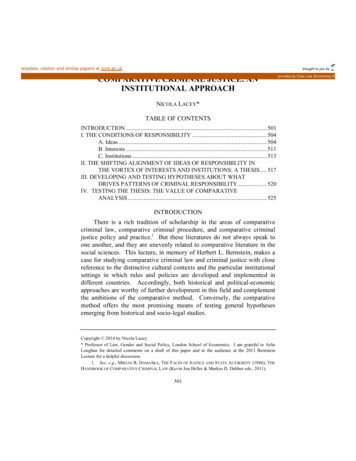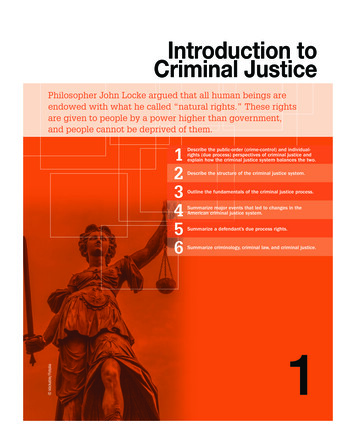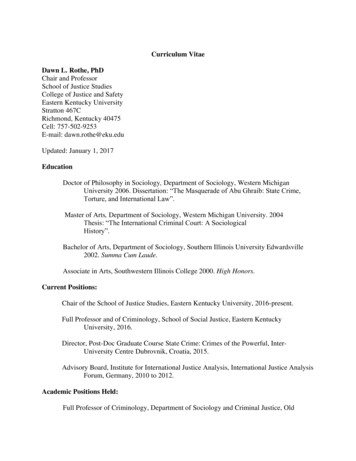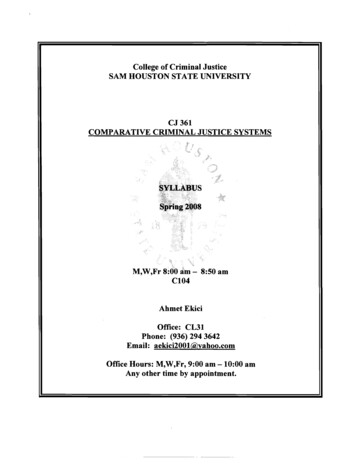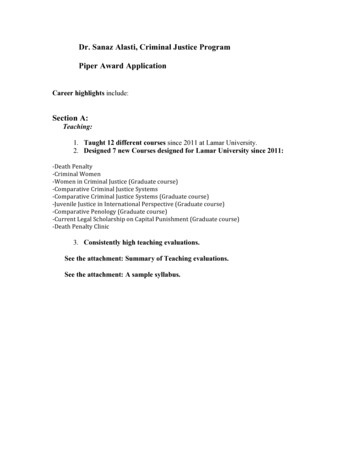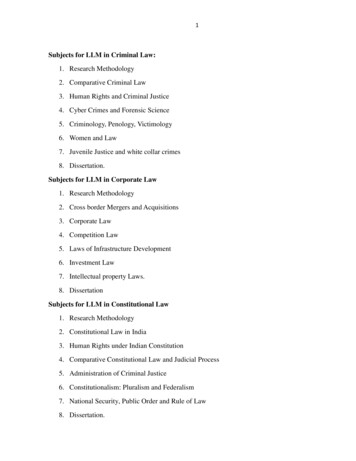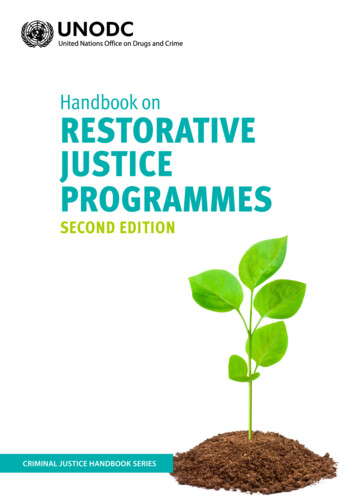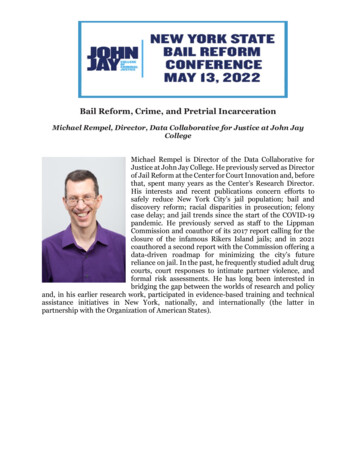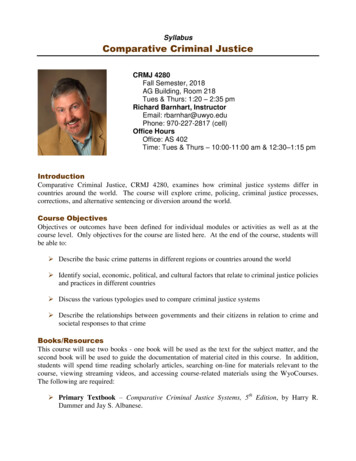
Transcription
SyllabusComparative Criminal JusticeCRMJ 4280Fall Semester, 2018AG Building, Room 218Tues & Thurs: 1:20 – 2:35 pmRichard Barnhart, InstructorEmail: rbarnhar@uwyo.eduPhone: 970-227-2817 (cell)Office HoursOffice: AS 402Time: Tues & Thurs – 10:00-11:00 am & 12:30–1:15 pmIntroductionComparative Criminal Justice, CRMJ 4280, examines how criminal justice systems differ incountries around the world. The course will explore crime, policing, criminal justice processes,corrections, and alternative sentencing or diversion around the world.Course ObjectivesObjectives or outcomes have been defined for individual modules or activities as well as at thecourse level. Only objectives for the course are listed here. At the end of the course, students willbe able to: Describe the basic crime patterns in different regions or countries around the world Identify social, economic, political, and cultural factors that relate to criminal justice policiesand practices in different countries Discuss the various typologies used to compare criminal justice systems Describe the relationships between governments and their citizens in relation to crime andsocietal responses to that crimeBooks/ResourcesThis course will use two books - one book will be used as the text for the subject matter, and thesecond book will be used to guide the documentation of material cited in this course. In addition,students will spend time reading scholarly articles, searching on-line for materials relevant to thecourse, viewing streaming videos, and accessing course-related materials using the WyoCourses.The following are required: Primary Textbook – Comparative Criminal Justice Systems, 5th Edition, by Harry R.Dammer and Jay S. Albanese.
Comparative CJPage 2 Reference Manual - Publication Manual of the American Psychological Association, 6thEdition. OnlineUW – Online WyoCourses is the University’s on-line supplemental course website.To register, go to: http://uwadmnweb.uwyo.edu/ctl/Online courses/student.htm and followthe instructions. If you have difficulties with WyoCourses at any time during the semester,use the technical support available by calling 306-766-5499 or emailingonlnsupp@uwyo.edu. Microsoft Word – Various documents must be submitted in an electronic format inMicrosoft Word. Paper copies or electronic files in electronic formats other than MicrosoftWord will not be accepted.Class ScheduleThis course takes place between August 30, 2018 and December 12, 2018. All assignments are dueby 11:59 p.m. on the day cited in the Course Chart. For a detailed breakdown of assignments foreach week of the course, see the attachment to the syllabus titled Course Chart.Course AssignmentsCourse work will consist of completing a diverse set of assignments. These are briefly describedbelow. All quizzes and written assignments are due before 11:59 p.m. on Sunday evening of theweek listed in the Course Chart. Any changes to due dates will be posted in the Announcementsarea of WyoCourses. Assignments may not be completed and/or submitted late without an excusedabsence. Quizzes – A quiz will be taken every three to four weeks. The exam may be taken anytimeduring the week in which it is due. Each quiz consists of multiple-choice, true-false,matching, and completion questions. Questions (and the answers) are drawn from the twotexts, the lectures, research articles, and videos. A quiz may be taken twice; if retaken, thehigher of the two scores will be counted. The quizzes are worth 46 weighted points towardthe final grade. Discussion Boards – Over the course of the semester, six discussion boards will be held(one approximately every two weeks). For details about how the discussion boards will beconducted, see the syllabus attachment titled Discussion Boards. The six discussion boardsare worth 54 weighted points toward the final grade. Extra Credit – There are 100 weighted points assigned to the regular course assignments.An additional four weighted points (making a total of 104 weighted points) are available tohelp a student who is close to receiving the next higher grade. The extra credit quiz is 25multiple choice, true/false, matching, and completion questions about APA formatting. Itcan be taken any time during the semester.GradingThe final grade for the course will be based on the weighted points accumulated over the course ofthe semester. One hundred total points are possible for each of the assignments. The pointsreceived for an assignment must then be multiplied by the assigned weighted to determine the
Comparative CJPage 3weighted points earned for that assignment. The weighted points for all assignments are then addedup to get the final grade for the course. A person receiving 90% or more of the possible weighted points will receive an A. A person receiving from 80% to 89% of the possible weighted points will receive a B. A person receiving from 70% to 79% of the possible weighted points will receive a C. A person receiving from 60% to 69% of the possibleweighted points will receive a D. A person receiving less than 60% of the possibleweighted points will receive an F.WeightingDiscussion Boards . . . 54%Quizzes . . . . . . . . . . . . 46%Extra Credit Quiz . . . . 04%Total . . . . . . . . . . . . . 104%Points for assignments will be posted in WyoCourses.Points for quizzes will be available upon completion of the test. Points for the discussion boardsand the research paper will normally be posted within two weeks. The final weighted score will notbe rounded up; for example, an 89.8% will be a B and will not be rounded up to an A. The extracredit quiz is there to help you make the leap to the higher grade.Students with DisabilitiesIt is University of Wyoming’s policy to accommodate students, faculty, staff, and visitors withdisabilities. If you have a physical, learning, sensory, or psychological disability and requireaccommodations, please let the instructor know as soon as possible. You will need to register withUniversity Disability Support Services (UDSS) in the Student Educational Opportunity offices,Room 330 Knight Hall, and provide UDSS with documentation of your disability.Academic HonestyAny form of academic dishonesty, including plagiarism, collaborating on or otherwise cheating onexams, exercises, or assignments of any sort will be reported to the appropriate Universityauthorities for disciplinary action and may be grounds for expulsion from the University. To readthe University’s policy on academic dishonesty, click on UW Regulation 6-802 and review thedocuments that are provided there. If you have any questions about what constitutes academicdishonesty, consult the regulations or arrange to meet with the instructor before you submit thematerials in question. Students engaging in academic dishonesty will receive zero points for theassignment in which the violation took place.Excused AbsencesAssignments can be completed at the student’s discretion during the days prior to the due date.Excused absences must be made up within seven days of the original due date or the end of theexcused absence period (whichever is later). Excused absences procedures apply to all assignments,including missing class. Excused absences include the following: University Excuse - In order to be excused from meeting a deadline, a valid Universityexcuse must be obtained. University excuses can be obtained from the Office of StudentLife (Room 128 Knight Hall, University of Wyoming, Laramie, WY 82071 - telephone:307-766-3296) between the hours of 8 a.m. and 5 p.m. Monday through Friday. The Office
Comparative CJPage 4of Student Life (OSL) will provide the excuse, provided the student’s absence meets thecriteria for an authorized absence. Serious Illness - A serious illness is defined as a medical condition that requireshospitalization, immediate treatment at a doctor’s office or medical facility, and/or bed restwhich makes it impossible for the student to complete the scheduled expectation of the class.To be considered a serious illness, a doctor’s written excuse must be provided which statesthat, on the days preceding the missed assignment, the student was unable to complete thetasks defined by the syllabus. Doctor’s excuses must be obtained from your attendingphysician. These excuses must be for the days in question, and must state that you wereunable to do the assignment. Doctor’s appointments do not constitute an excused absence.Excuses need to be presented to the instructor within two days of the missed assignment. Death in the Immediate Family - An immediate family member is defined as father,mother, sibling, spouse, or child.Documentation must be provided; acceptabledocumentation includes an obituary published in a commercial newspaper which lists thestudent as an immediate family member, or a letter from a member of the clergy on churchstationary confirming the death and the relationship of the deceased to the student. Special Circumstances - It is understood students have a life outside university classes. Forexample, a person may be required to appear in court. Accommodations will be made toallow students to be absent when special circumstances create conflicts with assignmentsdefined in the syllabus. Special circumstances are up to the course instructor to approve.Late AssignmentsAssignments may be turned in up to five days late. There is a 10% per day late penalty for a lateassignment. Assignments may not be turned in more than five days after the original deadline.Placing the wrong file or a corrupted file in a drop box will be accepted as a submission. An initialthread for a discussion board is due on Tuesday evening; late penalties apply after Tuesday evening.Participation points are awarded during the week of the discussion board, and may not be made up.Office Hours/AdvisingOffice hours will be held at the times listed at the top of the syllabus. Students desiring additionaltime can request it and a mutually agreed upon time will be arranged.InstructorThe instructor lives in Fort Collins, Colorado. Communication by email is welcomed andencouraged. The goal is to make this class a learning experience for students and the instructor, andan ongoing dialogue between students and the instructor is seen as an important component oflearning. Emails with questions about the course content and other topics relevant to the course areconsidered an essential part of the course. Feel free to communicate via email. The instructorspends a portion of every day working on the computer and carries a smart phone. As a result, anemail may be answered within minutes, and will generally be answered the same day. It will be arare occasion that an email is not returned within 24 hours. If you do not receive an answer to anemail within 48 hours, please resend it; it may have gotten lost somehow.Communication by cell phone outside of scheduled office hours should be viewed as a last resortand reserved for emergencies. Feel free to call if you have an emergency. Voice mail is available
Comparative CJPage 5so if the phone is not answered feel free to leave a message; a call because of an emergency will bereturned promptly, and making the instructor aware of a problem as soon as possible is important.
Comparative Criminal Justice CRMJ 4280 Fall Semester, 2018 AG Building, Room 218 Tues & Thurs: 1:20 - 2:35 pm Richard Barnhart, Instructor . examines how criminal justice systems differ in countries around the world. The course will explore crime, policing, criminal justice processes, corrections, and alternative sentencing or diversion .
